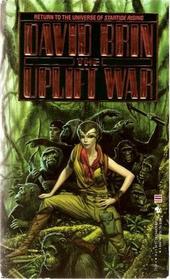Helpful Score: 2
This was the first book that I read in the series, and I loved it. When I went and read the others, well, they didn't really do it for me. Funny how that works. I like this book because it has a lot about communicating with and relating to other alien species.
Book three in Brin's Uplift series. Alien races are at war, and (of course) Earth and five galaxies are at stake. It gives an inventive twist to a tired idea.
The Uplift War and Startide Rising take place simultaneously but at different locations in the galaxy and so should be read back-to-back or even at the same time alternating the internal chronology from one book to the next (I've done both). This pair of novels ranks as some of the greatest modern science fiction ever written. The characters are placed in impossible situations, massive space battles, a melange of cultures and alien races, centered around a mystery wrapped in an enigma and accompanied by some of the corniest yet most hilarious puns and double entendres to be found. Would you like to engage in a gorilla war in the jungle anyone?
Terrific. Best one of the trilogy. I actually read this first (despite the fact that it is the last of the Uplift Trilogy). Interesting treatment of evolution and sentience.
David Brin has written quite a few novels by now, but my favorites are the Uplift series. In chronological order within the novels, these are: Sundiver, Startide Rising, The Uplift War, Brightness Reef, Infinity's Shore, and Heaven's Reach (on a side note, I love his titles, and the poetry in the books that they come from). They are not exactly light reading, but they're very well done if you like complicated plots.
In the future in which these are set, mankind has genetically altered both dolphins and chimpanzees (and are possibly going to add dogs to the list) to be more intelligent and capable of human speech. They managed to do this just before the other sentient beings in the universe discovered humanity's existence, which is the only thing that kept some of these other species from immediately taking humans in hand for some reengineering. Galactic culture is based on this proces of uplift, where more advanced races alter the genetics of proto-sentient races in a long chain back to the Progenitors. Because humanity uplifted two species before we were discovered, that gives us the status of patrons, rather than clients which can be altered in whatever manner the patron species chooses. Which leads to some messy Galactic politics, as some races are not happy at all about the status or presence of humanity, which is a "wolfling" species - a species whose patrons seem to have abandoned them. Which is where the novels begin.
In the future in which these are set, mankind has genetically altered both dolphins and chimpanzees (and are possibly going to add dogs to the list) to be more intelligent and capable of human speech. They managed to do this just before the other sentient beings in the universe discovered humanity's existence, which is the only thing that kept some of these other species from immediately taking humans in hand for some reengineering. Galactic culture is based on this proces of uplift, where more advanced races alter the genetics of proto-sentient races in a long chain back to the Progenitors. Because humanity uplifted two species before we were discovered, that gives us the status of patrons, rather than clients which can be altered in whatever manner the patron species chooses. Which leads to some messy Galactic politics, as some races are not happy at all about the status or presence of humanity, which is a "wolfling" species - a species whose patrons seem to have abandoned them. Which is where the novels begin.




